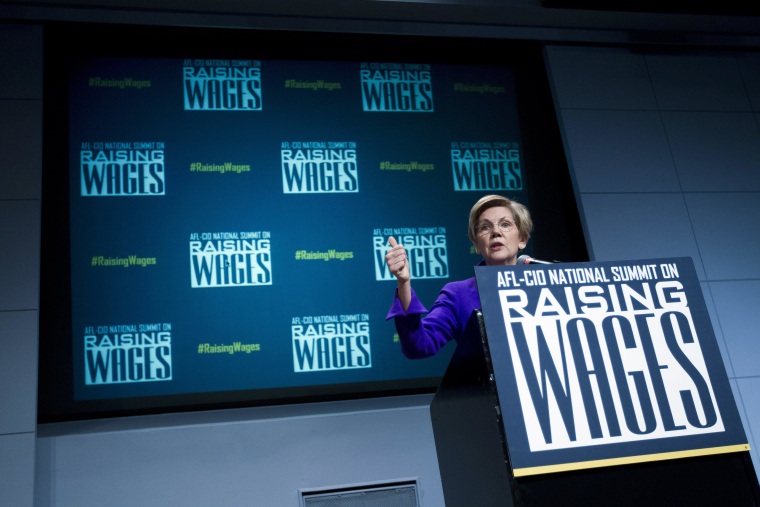Key voices in both parties are rejecting the optimistic way President Barack Obama is describing the current state of the American economy, illustrating an important divide that could impact both the president’s last two years in office and the 2016 campaign.
In a statement on his website Tuesday announcing his new political action committee, former Florida governor and likely 2016 presidential candidate Jeb Bush wrote that “while the last eight years have been pretty good ones for top earners, they’ve been a lost decade for the rest of America.”
A day later, Massachusetts Sen. Elizabeth Warren told an audience that she's well aware of data points - like growing GDP, low unemployment, a surging Dow and low inflation - that today’s economic optimists are fond of citing.
But she added an important caveat.
"I've spent most of my career studying what's happening to America's middle class, and I know that these four widely-cited statistics give an important snapshot of the success of the overall economy," she said at a “Raising Wages” conference in Washington that was sponsored by AFL-CIO, one of the nation’s largest labor unions. "But the overall picture doesn't tell us much about what's happening at ground level to tens of millions of Americans. Despite these cheery numbers, America's middle class is in deep trouble."
“Corporate profits and GDP are up. But if you work at Walmart, and you are paid so little that you still need food stamps to put groceries on the table, what does more money in stockholders’ pockets and an uptick in GDP do for you?" she added.
At the same event, Neera Tanden, president of the Center for American Progress, a think tank with close ties to the Obama administration, bemoaned "growing inequality" and "the erosion of collective bargaining."
Obama is telling Americans a different story: namely that “America’s resurgence is real." Unemployment has dropped below 6 percent, the U.S. GDP increased by 5 percent in the third quarter of 2014, according to recently-released data, and a huge drop in gas prices has saved millions of Americans money.
“America is making significant strides where it counts,” Obama said in a recent speech. “The steps we took nearly six years ago to rescue our economy and rebuild it on a new foundation helped make 2014 the strongest year for job growth since the 1990’s. Over the past 57 months, our businesses have created nearly 11 million new jobs. And in a hopeful sign for middle-class families, wages are on the rise again.”
These contrasting views come as Obama tries to use the economic gains to build support for the rest of his agenda for his final two years in office, while leaders in both parties are crafting their ideas with an eye toward the 2016 campaign, when both parties will want to show contrasts with the incumbent president.
Obama is not unaware of the challenges that Warren and Bush laid out, noting recently that “we now have the chance to reverse the decades-long erosion of middle-class jobs and incomes.” One of the president’s top economic aides, Labor Secretary Thomas Perez, also spoke at the AFl-CIO event, calling for increasing the minimum wage and strengthening workers’ protections against labor law violations by their companies, ideas Warren echoed.
The president himself regularly speaks of income inequality, wage stagnation and the lack of upward mobility, the three challenges that many on the right and left feel plague the American economy.
Warren, in turn, acknowledges some of the successes of the economy under Obama’s leadership. During her speech, she led the crowd in a round of applause for the president, saying “job growth is a big deal.”
Economists say that while there are some signs of wage growth in the middle class, data suggests the general stagnation of the last decade remains, with much of the recent gains going to the wealthiest Americans. Unemployment has dropped, but millions of Americans who want full-time jobs are currently stuck in part-time ones.
But what happens over the next two years in the economy will help shape politics as well. If middle-class wages remain stagnant, the president will struggle to convince Americans the economy has truly improved. That will both hurt his legacy, as Obama has cast his presidency as one where the economy showed huge improvement, and potentially complicate Hillary Clinton’s likely campaign to replace him.
If wages do increase, Republican candidates like Bush will be offering a less compelling argument in saying that “millions of our fellow citizens across the broad middle class feel as if the American Dream is now out of their reach,” as the former governor wrote Tuesday.
And Warren, who is looking to push the Democratic Party to the left, may find less currency for her more liberal ideas, which many Democrats right now want Clinton to adopt. In her speech, Warren called for breaking up large banks like Citigroup, an idea Obama rejected when he first entered office and has shown no signs of supporting since.
